An impressive upgrade with none of the appeal of its competition.
Microsoft took the wraps off its 2021 lineup, and of course, that includes an Android phone — the Surface Duo 2. The introduction of the device was a slick affair and spent plenty of time telling potential customers why they might want to spend "foldable" money with Microsoft. The company did a good job conveying why the Surface Duo 2 is a great device but not enough when it comes to claiming the best foldable phone spot.
Technology for technology's sake serves no one.
What I think the company did exceptionally well was explain why the Duo 2 is great without telling us its predecessor wasn't. We didn't hear how much better version 2 is compared to version 1, just that it was fast and capable. We also heard no comparisons to the Duo's true competition, which of course is Samsung's Galaxy Z Fold 3 and Z Flip 3. This, in my opinion, is where the mistakes started.
From what I've seen — I've never used a Fold or Flip 3 or even seen the Duo 2 — Microsoft has made a compelling product with zero sex appeal. Everything that needed to be addressed from the original Duo — from the newer, faster digitizer, the stronger aluminum frame, and cameras good enough to be in a high-end phone — is there. Microsoft also made some thoughtful additions like the glance bar built into the device hinge, giving an interesting way to see what might be going on inside the phone. This is exactly what Microsoft needed to do.
Where is the cool factor?
What the company also needed to do but couldn't pull off was make the device cool. I don't mean cool as in uber-functional and powerful; Microsoft gave us that. I mean cool as in fun with your friends doing things better than any other phone can do them. Foldables aren't your average phone, and average tactics aren't going to get anyone excited about buying one. Don't just tell me about the Xbox tie-in, Microsoft; Show me a small group of people enjoying it.
One day, phones that fold or twist or grow somehow into large-screen devices may be the norm but right now they are a niche market filled with educated consumers. Normally these would be Microsoft's favorite type of buyer, people who know technology and understand why something like an actual glass display may be better than a glass and polymer composite display or can recognize the difficulty in pairing two completely digitizers spanning two separate displays. Tech nerds both love and hate Microsoft's products, but in the end, most will buy them. Phones are different, though, and Microsoft still isn't getting it.
Marketing is a powerful tool. More powerful than a spec sheet.
Most people buy a phone to be more than a tool. A phone is entertaining. A phone is fun. A phone is a way to bring people together. The Surface Duo 2 is almost certainly some or all of those things, yet Microsoft didn't show us how. We've all heard how marketing is a big part of a company's success and that's true. Apple and Samsung make great products. LG and Google also make (made) great products. Now compare which companies can sell tens of millions of smartphones year after year and you'll see that marketing matters. You know you're going to have fun with a Z Fold 3 because Samsung told you, then showed you the cool side of the product.
None of this diminishes what the Duo 2 is capable of doing or how great of a foldable it may be. Like last year, if forced to buy a folding phone I would pick the Duo 2 because I think I'd get more use from two well-defined displays instead of a more fragile one-piece. Many tech-savvy consumers who pore through spec sheets may also find the Duo 2 a better buy.
Most people looking to buy a foldable already have a Samsung phone picked out.
But most people who want a foldable phone already have seen the one for them. The capable and cool Galaxy Z Fold 3 or the fun Z Flip 3. Likewise, customers looking for a reason to buy a folding phone are going to be enticed by Samsung's colors and brand awareness before they ever touch one.
The Duo 2 will be more successful than the original when it comes to sales and the improvements will lead to more satisfied buyers. But Microsoft needs to do more in the presentation if it ever wants to move out of its niche in the market.
Source: androidcentral


